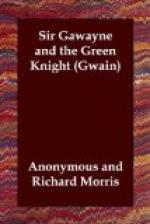[Sidenote A: “Good sir,” says Gawayne,
“ask the high lord of this house to
grant me a lodging.”]
[Sidenote B: “You are welcome to dwell
here as long as you like,” replied
the porter.]
[Sidenote C: The draw-bridge is let down,] [Sidenote
D: and the gate is opened wide to receive him.]
[Sidenote E: His horse is well stabled.] [Sidenote
F: Knights and squires bring Gawayne into the
hall.] [Sidenote G: Many a one hastens to take
his helmet and sword.] [Sidenote H: The lord
of the country bids him welcome,] [Sidenote I:
and they embrace each other.] [Footnote 1: trowoe,
Ms.] [Footnote 2: quyle (?) or quen (?).]
[Footnote 3: buurne, Ms.]
XV.
[A] Gawayn gly3t on þe gome þat
godly hym gret,
[B] & þu3t hit a bolde burne þat þe bur3 a3te,
844 A hoge haþel for þe none3, & of hyghe elde;[1]
[C] Brode bry3t wat3 his berde, & al beuer hwed,
Sturne stif on þe stryþþe on stal-worth schonke3,
[D] Felle face as þe fyre, & fre of hys speche;
848 & wel hym semed for soþe, as þe segge þu3t,
To lede a lortschyp in lee of leude3 ful
gode.
[E] Þe lorde hym charred to a chambre, & chefly
cumaunde3[2] [Fol.]
To delyuer hym a leude, hym lo3ly to serue;
[102b.]
852 & þere were boun at his bode burne3 in-no3e,
[F] Þat bro3t hym to a bry3t boure, þer beddyng
wat3 noble,
Of cortynes of clene sylk, wyth cler golde
hemme3,
[G] & couertore3 ful curious, with comlych pane3,
856 Of bry3t blaunnier a-boue enbrawded bisyde3,
Rudele3 rennande on rope3, red golde rynge3,
[H] Tapyte3 ty3t to þe wo3e, of tuly & tars,
& vnder fete, on þe flet, of fol3ande sute.
860 [I] Þer he wat3 dispoyled, wyth speche3 of myerþe,
Þe burn of his bruny, & of his bry3t wede3;
[J] Ryche robes ful rad renkke3 hem[3] bro3ten,
For to charge, & to chaunge, & chose of þe
best.
864 Sone as he on hent, & happed þer-inne,
Þat sete on hym[4] semly, wyth saylande skyrte3,
[K] Þe ver by his uisage verayly hit semed
Wel ne3 to vche haþel alle on hwes,
868 Lowande & lufly, alle his lymme3 vnder,
[L] Þat a comloker kny3t neuer Kryst made,
hem þo3t;
Wheþen in worlde he were,
872 Hit semed as he my3t
Be prynce with-outen pere,
In felde þer felle men fy3t.
[Sidenote A: Gawayne looks on his host;] [Sidenote
B: a big bold one he seemed.] [Sidenote C:
Beaver-hued was his broad beard,] [Sidenote D:
and his face as “fell as the fire.”] [Sidenote
E: The lord leads Gawayne to a chamber, and assigns
him a page to
wait upon him.]
[Sidenote F: In this bright bower was noble bedding;]
[Sidenote G: the curtains were of pure silk with
golden hems;] [Sidenote H: Tarsic tapestries
covered the walls and the floor.] [Sidenote I:
Here the knight doffed his armour,] [Sidenote J:
and put on rich robes,] [Sidenote K: which well
became him.] [Sidenote L: A more comely knight
Christ never made.] [Footnote 1: eldee, Ms.]
[Footnote 2: clesly, Ms.] [Footnote 3:
hym (?).] [Footnote 4: Ms. hyn.]




